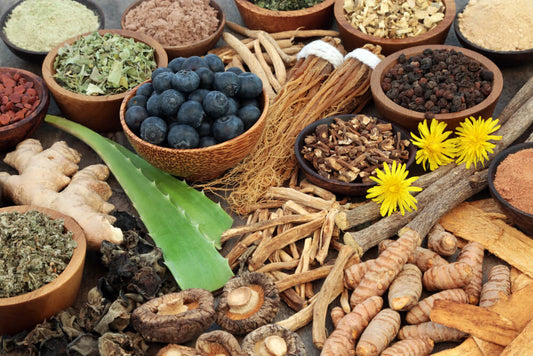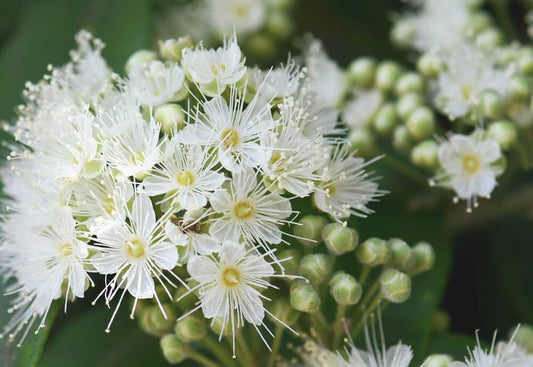
What Is Pine Pollen and Its Remarkable Health Benefits?
Have you ever wondered what that microscopic dust covering your car is? Well, it could actually be the powerhouse of nutrients known as pine pollen.
This incredible substance, derived from pine trees, is more than just a seasonal nuisance - it’s a marvel of nature, packed with a nutritional profile that rivals many superfoods and offers loads of health benefits and in this article, we're going to discuss these and the possible effects of pine pollen.
Key Takeaways
- Pine pollen, harvested from various pine tree species, is influenced by geographic factors and is a nutrient-rich substance containing essential amino acids, proteins, and vitamins such as B and E.
- It has a range of health benefits including immune system support, anti-aging and antioxidant properties, and potential hormonal balance, though scientific evidence for some claims is limited.
- While pine pollen offers potential health advantages and can be incorporated into food, it is essential to consider precautionary measures regarding allergies, side effects, and consult healthcare providers for proper dosing.
Understanding Pine Pollen: Nature's Microscopic Marvel
Pine pollen, a tiny, dust-like substance, comes from various pine trees, including the Masson pine and Scots pine. This microscopic marvel is influenced significantly by geographical factors such as altitude, climate, and soil characteristics, leading to substantial variations across diverse species and geographic regions.
The chemical composition of pine pollen, carrying a component known as pine pollen polysaccharide, can be as diverse as the locations they originate from.

Varieties of Pine Pollen
There’s a dazzling array of pine pollen types, each with unique characteristics. Some common types include:
- Masson pine pollen, derived from the Masson pine tree species
- Cypress pine pollen, produced by the cypress pine tree
- Juniper pine pollen, produced by the juniper pine tree
- Scots pine pollen, produced by the Scots pine tree
These trees are recognised for their substantial pollen production.
Diverse forms of pine pollen, including Pinus sylvestris and Pinus masoning pollen, showcase unique attributes in size, shape, and texture, highlighted by distinct visual traits such as rings, oval rings, or bright spots.
Harvesting Pine Pollen
Harvesting pine pollen is an art and science, involving techniques such as the tapping method, butter and honey method, and timing method. The collection process is gentle, shaking the pollen from the cones and sifting out any brown bits with cheesecloth over a strainer to avoid damage to the trees.
After harvest, pine pollen is subjected to several processes such as drying, impurity removal, sterilisation, wall disruption, packaging, and storage.
Nutritional Profile of Pine Pollen
Pine pollen, celebrated for its robust nutritional profile, is packed with essential amino acids such as methionine, lysine, threonine, histidine, and leucine, as well as non-essential amino acids like arginine, cysteine, and glutamine. It also contains proteins encompassing these essential amino acids and vitamins B and E, offering a unique blend of nutrients.
Supplementing these, pine pollen also offers nutritional benefits including fibre, saccharides, and phytosterols, enhancing its nutritional composition.
Amino Acids and Proteins
The health benefits of pine pollen can be attributed to its rich content of essential and non-essential amino acids. It boasts a significant protein content, averaging at 22.7%, and encompasses a range of essential amino acids. These amino acids promote muscle growth and recovery, support hormonal balance, and supply the essential components for protein synthesis, playing a crucial role in the physiological functions of the body.
Vitamins and Minerals
Beyond amino acids and proteins, pine pollen offers a wealth of vitamins and minerals. Here are some of the key nutrients found in pine pollen:
- Vitamin D
- B vitamins
- Vitamin E
- Calcium
- Magnesium
These nutrients enrich its nutritional profile, making pine pollen a valuable dietary supplement.
Compared to other common foods, pine pollen provides a higher concentration of most vitamins and a unique composition, including minerals like calcium and magnesium when contrasted with other supplements.
The Health Advantages of Pine Pollen

Pine pollen is more than just a nutritional powerhouse; it also brings to the table significant potential health benefits. These benefits range from supporting the immune system, possessing anti-aging properties, and potentially contributing to hormonal balance.
Immune System Support
The contribution of pine pollen to immune system support is significant. Its benefits include:
- Antioxidant properties
- Anti-inflammatory properties
- Immune regulation potential
- Potential aid to individuals with a compromised immune system
Clinical studies have shown these beneficial impacts, indicating the potential effect of pine pollen in immune regulation.
Anti-Aging and Antioxidant Activity
Pine pollen’s antioxidant activity holds a pivotal role in its anti-aging properties. Specific antioxidants such as proanthocyanidins, phenolic compounds, and flavonoids contribute to various health benefits such as stimulating collagen formation, angiogenesis, granulation tissue and hair follicles regeneration, as well as the regulation of the inflammatory process. These antioxidants prevent oxidative stress and damage caused by free radicals in the body, thereby contributing to slowing down the aging process and promoting a younger, healthier appearance.
Potential Hormonal Balance
Hormonal balance might also benefit from pine pollen. Its adaptogenic properties may regulate hormone levels, including testosterone and cortisol. However, it’s important to note that there is insufficient evidence to strongly corroborate this claim. Thus, it is crucial to exercise caution and seek medical advice when considering its use.
Pine Pollen in Traditional Chinese Medicine

The history of pine pollen in Traditional Chinese Medicine includes:
- Known for its nourishing and energy-replenishing tonic properties
- Used to provide anti-aging attributes
- Used to relieve fatigue
- Used to enhance testosterone levels
Pine pollen extract has been used in this ancient medicinal practice for these purposes.
Historical Uses
Pine pollen, referred to as ‘Songhua fen’ or ‘Song Huang’ in Chinese medical tradition, has been used since the Tang Dynasty for its purported abilities to tonify the major organs and enhance lung health. It has been used to treat conditions such as bedsores, diaper dermatitis, hyperlipidaemia, oral mucositis, eczema, hyperplasia of the prostate, hypertension, prostatitis, type 2 diabetes mellitus, and radiodermatitis. The China National Knowledge Infrastructure has documented the historical use and benefits of pine pollen in traditional medicine.
Modern Adaptations
Contemporary applications of pine pollen persist in probing its potential benefits. Today, it’s used in herbal mixtures within Traditional Chinese Medicine to address conditions such as:
- colds
- prostate problems
- bedsores
- eczema
Improvement in analytical tools has led to a better understanding of the pharmacological characteristics of pine pollen, strengthening its reputation as a potent adaptogenic herb.
Culinary and Supplemental Forms of Pine Pollen

Beyond medicinal use, pine pollen can also serve as a multifaceted culinary ingredient. Available in powder and capsule forms, pine pollen can be enjoyed as part of your diet or as a supplement.
Pine Pollen Powder and Capsules
Whether you choose pine pollen powder or capsules, you’re in for a host of potential health advantages. These range from:
- Anti-aging effects
- Fatigue relief
- Testosterone enhancement
- Support for male hormones
However, it’s important to consider potential side effects and consult a healthcare professional before using this supplement, especially if you’re seeking its blood lipid lowering effect.
Incorporating Pine Pollen in Food
Pine pollen can be a delightful addition to your meals. Its gentle and pleasing flavour profile with subtle hints of cheese and yeast can enhance a wide variety of dishes, including:
- pastas
- stews
- baked goods
- smoothies
Pine pollen can provide a nutritional boost without compromising the dish’s original Flavors.
Safety and Precautions When Using Pine Pollen
Despite the potential benefits of pine pollen, safety precautions warrant consideration. These include:
- Recognising potential allergies
- Side effects
- Risks linked to pine pollen
- Consulting a healthcare provider for appropriate dosage.
Recognising Allergies
Pine pollen allergies can manifest as:
- Sneezing
- Sniffling
- Watery eyes
- Other typical allergic reactions
While the prevalence of pine pollen allergy may range from 2% to 10%, it’s crucial to get tested if you suspect an allergy. This usually involves a skin prick test administered by a medical professional.
Recommended Dosage and Healthcare Provider Guidance
When it comes to dosage, it’s best to consult a healthcare provider. They consider various factors, including your age, overall health condition, specific health goals or concerns, and any existing medical conditions or medications you’re taking. Typically, the suggested dosage for pine pollen supplements ranges from 500 mg to 1 g per day. However, exceeding the recommended dosage may entail potential hazards, emphasizing the need for professional guidance.
Environmental Impact and Sustainability of Pine Pollen Harvesting
Sustainability takes precedence in the harvesting of pine pollen. While pine pollen does have environmental implications, such as pollution of waterways and potential allergies, careful and sustainable harvesting can minimise these impacts.
Some key practices for sustainable harvesting of pine pollen include:
- Harvesting only a small portion of the pinecones to ensure the reproductive cycle of the trees is not disrupted
- Collecting pollen in a way that does not harm the tree or its surrounding environment
- Using sustainable and eco-friendly methods for processing and packaging the pollen
By following these practices, we can ensure that the harvesting of pine pollen is done in an environmentally responsible manner.
Where to Buy Pine Pollen
Should you be keen to explore the miracles of pine pollen, you can do so right here online at Superfoods Australia. We offer various, sustainably sourced pine pollen products that can be shipped anywhere in Australia.
Summary
Pine pollen is more than just a seasonal nuisance - it’s a nutritional powerhouse, a potential health supplement, and a time-honoured element of Traditional Chinese Medicine. Whether you’re seeking to boost your immune system, slow down the aging process, or simply enrich your diet, pine pollen might just be the superfood you’re looking for.
Frequently Asked Questions
What is the purpose of pine pollen?
Pine pollen serves multiple purposes, including potentially lifting mood, supporting quick relief from muscle aches, and providing anti-aging properties. It has been used in traditional medicine for its health benefits, such as boosting testosterone and treating various conditions. While its applications in the food industry are diverse, more research is needed to fully understand its health benefits.
Is pine pollen a good supplement?
Yes, pine pollen is a good supplement due to its natural source of vitamins, minerals, and antioxidants, which may support overall health and wellness. These benefits include increased energy, improved immune function, and enhanced athletic performance.
Does pine pollen increase testosterone levels?
Yes, pine pollen contains Phyto androgens that can promote overall testosterone production, making it a potential natural ingredient to increase testosterone levels.
What is pine pollen, and where does it come from?
Pine pollen is a tiny substance derived from pine trees, including species like Masson pine and Scots pine. It's influenced by geographical factors such as altitude, climate, and soil characteristics, leading to variations across diverse species and geographic regions.
What nutrients does pine pollen contain?
Pine pollen contains essential and non-essential amino acids, proteins, vitamins, minerals, fibre, saccharides, and phytosterols, making it a nutrient-rich supplement.













